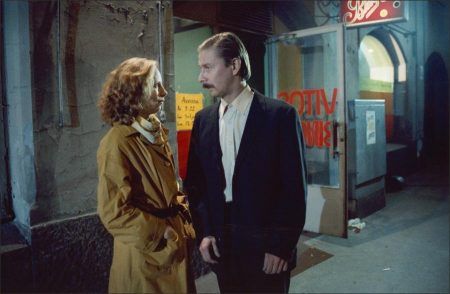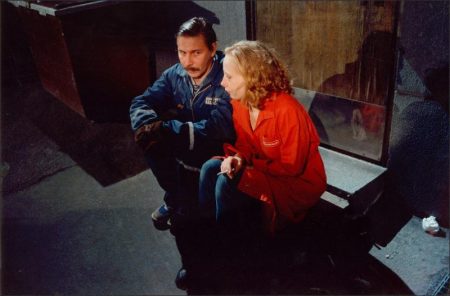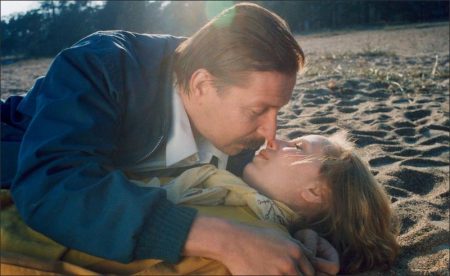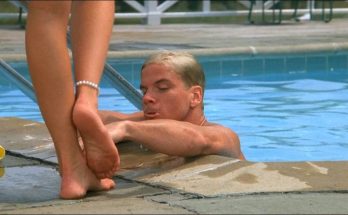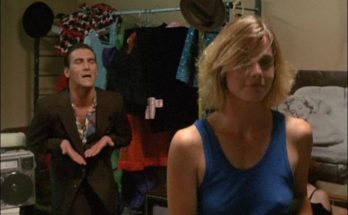Shadows in Paradise movie storyline. Only connect. In gray, class-conscious Helsinki, Nikander is a stoic, solitary garbage man. Cigarettes, coffee, bingo games, and English lessons border his circumscribed life. There are few words, no smiles, and no laughter. Violence and the threat of violence seem close at hand.
Ilona, a supermarket clerk who frequently loses her job, bandages Nikander’s hand one evening; later he gets her out of a jam, and they begin an on-again off-again relationship. “Why do I keep losing?,” Nikander asks his co-worker, Melartin, a man Nikander met in jail and helped get a job. Can he break his losing streak?
Shadows in Paradise (Finnish: Varjoja Paratiisissa) is a 1986 Finnish art house comedy-drama film written and directed by Aki Kaurismäki. The film stars Kati Outinen as Ilona and Matti Pellonpää as Nikander. Ilona is a supermarket check-out clerk who meets Nikander, a lonely garbage man, and they develop romantic feelings towards each other. Both of them are extremely shy so this hinders fast development of their relationship.
This is the first film in Kaurismäki’s Proletariat Trilogy (Shadows in Paradise, Ariel, and The Match Factory Girl). The trilogy has been released on Region One DVD by Criterion, in their Eclipse box-sets, and on region-free Blu-ray discs by Future Film in Scandinavia. Shadows in Paradise was awarded the Best Film award at the 1987 Jussi Awards.
About the Story
Shadows in Paradise (Varjoja paratiisissa marked Kaurismäki’s first collaboration with Kati Outinen, who has become the very symbol, alongside the late Matti Pellonpää, of Kaurismäki’s cinema.
It remains one of his finest works, though for some peculiar reason, one of his least watched, and a valuable introduction to his world. Kaurismaki makes films about expressionless underdogs who mostly sit around and brood. His films are full of unobtrusive single-take scenes (or at least with minimal editing), moving portraits of lonely disenchanted people, very addictive viewing because you never know what happens next. Like his friend Jarmusch or Chantal Akerman, Kaurismaki is a master of minimalist filmmaking.
But what separates his work from others is his expert use of offscreen imagery (a kiss is represented by a hand holding a cigarette), the surprising spontaneity of his miserable characters (because the garbage man finds a record at the dump, he suddenly purchases a brand new stereo system in order to listen to it!), and a tacked-on, deliberately absurd happy ending (which impossibly gets his people out of the worst situations) which is meant to be his sly comment on the Hollywood films he despises.
Like any great film auteur such as Altman, Fellini, Preston Surges, or even Almodovar, Kaurismaki’s films are peopled with unforgettable, unique faces via his own stock company. Matti Pellonpaa is perfect as the garbage man (his slicked-back hair, big glasses and droopy moustache make him the quintessential oddball underdog), as is the blank-faced Kati Outinen, the recently fired supermarket cashier who finds romance with this man. Her flat, pale visage is like death warmed over.
Shadows in Paradise is the first of the Kaurismaki’s “loser” trilogy (followed by Ariel and The Match Factory Girl). It is a hilariously deadpan, wonderfully dark, yet strangely sweet, and compulsive viewing experience. A perfect introduction to the world of Kaurismaki!
Shadows in Paradise (1986)
Directed by: Aki Kaurismäki
Starring: Matti Pellonpää, Kati Outinen, Sakari Kuosmanen, Esko Nikkari, Kylli Köngäs, Pekka Laiho, Jukka-Pekka Palo, Svante Korkiakoski, Mari Rantasila, Safka Pekkonen, Ulla Kuosmanen
Screenplay by: Aki Kaurismäki
Production Design by: Timo Salminen
Cinematography by: Raija Talvio
Film Editing by: Tuula Hilkamo
Makeup Department: Leena Kouhia
Art Direction by: Pertti Hilkamo, Heikki Ukkonen
Distributed by: Finnkino
Release Date: October 17, 1986
Views: 104
